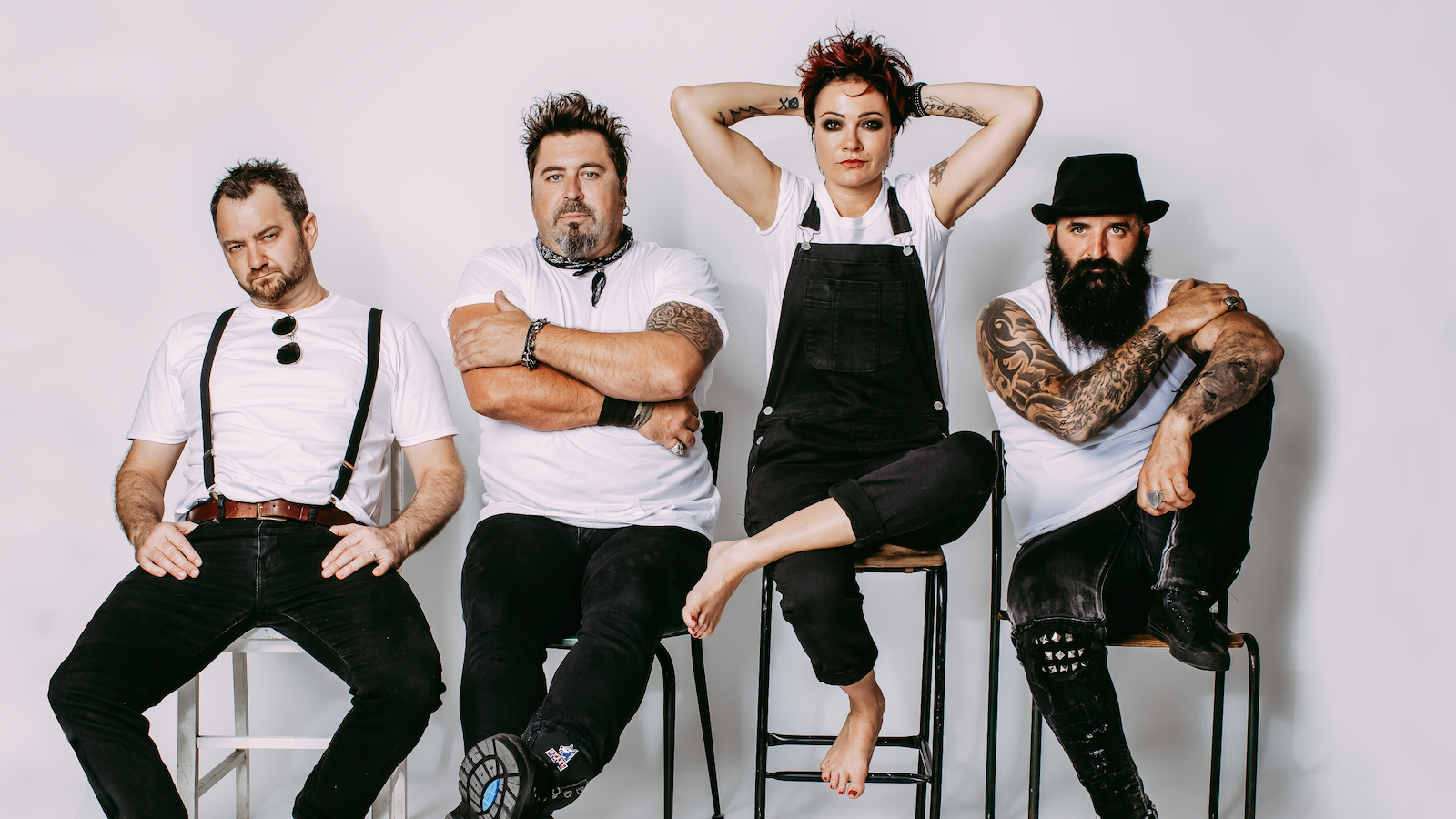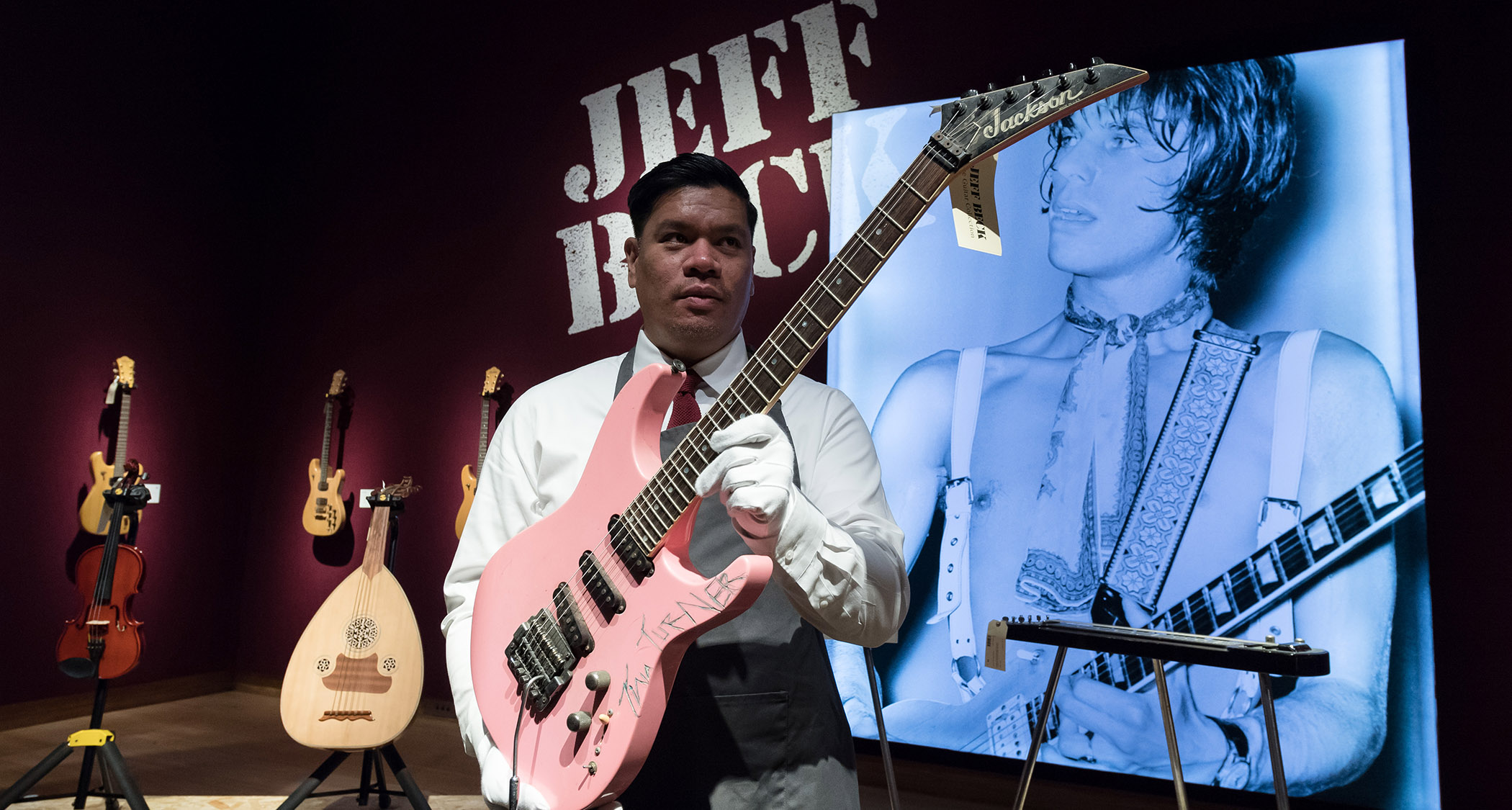The Superjesus’ Jason Slack: “I had no real plan from the start, I just wanted to make a guitar”
Ahead of their tour celebrating 2000’s Jet Age this September, Jason Slack gives us an exclusive tease of the homemade guitar he’ll be playing on it

When the beloved Adelaidian alt-rockers in The Superjesus head out on the (belated) 20th anniversary tour for their cracking debut, Jet Age, you might notice that lead guitarist Jason Slack – who joined the band a year after Jet Age hit shelves – is playing on a rather unique piece of kit. Before the 12-date run kicks off in September, Slack is building a bespoke, one‑of‑a‑kind guitar themed around the LP, and he’ll take it for its first spin onstage when The Superjesus play Jet Age in full.
After the tour, Slack will bid his Jet Age axe farewell. Don’t worry, it’s not being destroyed or anything – after it’s signed by the whole band, Slack will auction the piece off to one lucky Superjesus diehard, with a portion of the proceeds being donated to the Cure Brain Cancer Foundation. Slack’s father – who helped the lil’ ragamuffin build his first guitar at age 15 – recently passed away from Glioblastoma, an aggressive form of brain cancer. In addition to celebrating The Superjesus’ monolithic breakthrough album, the guitar is a loving tribute to him.
It’s not the only guitar Slack has in the works, however – at the moment, he tells Australian Guitar, he’s chipping away at two unique Tele-esque designs, a DC Junior type, a Superstrat, and a hybrid Jazzmaster/Mustang mash-up sure to drop jaws. And that’s just what he’s got in the pipeline to hone his chops. Though he’s always had a knack for the DIY side of things, Slack only recently decided to dive headfirst into the world of lutherie.
Between the pandemic, a fractured marriage, and the simple decision that it was time to do something new, Slack is finally living out his dream life as both a guitarist and a guitar-maker, all of his own volition. No rules, no bosses, no limitations – the sky is the limit; the world is his humbucker.
Australian Guitar jumped on a video chat with Slack to chat about his origins, endeavours and ambitions as a home-set luthier. And though we unfortunately can’t show you any of what he’s working on right now, we assure you that what little we did catch a glimpse of looks goddamn wicked!
Of course, every great story starts with an origin – what can you tell us about your first endeavour into lutherie?
Okay so, I went to a place on Poultney Street to meet Warrant. It was a meet and greet, which was really exciting for me as a young kid. And unfortunately my guitar got stolen; I had a Cort guitar – y’know, my first sort of half-decent electric guitar – and it was stolen out of my dad’s car. I had some friends lend me guitars for a while, and then because my dad was a carpenter, I asked him to get me some wood and we built a body together. I traced around an Ibanez RG Series guitar, and we went from there. And y’know, we had no experience and we used all the wrong tools, so some things took a really long time to do – like the sanding job, that was pretty gnarly... Man, it looked awful – but we got there in the end!
Do you still have that guitar?
I actually do! It’s around here somewhere! I’ve got so many guitars, it’s crazy [laughs].
All the latest guitar news, interviews, lessons, reviews, deals and more, direct to your inbox!
So you taught yourself how to service your own guitars, with a little wisdom from people like Andrew White and (the late) Pep Belcaro. What was it like for you, learning all the intricacies of the guitar by getting your hands dirty?
Well for me, it was a case of having many guitars that it was becoming really expensive to get all of them serviced. A good fret job was about $400 a pop, so it was just getting out of control. So I bought some stuff from StewMac, this luthier supply shop overseas, and just started doing my own setups. I had a rough idea of what to do, but Pep actually worked at Fretco, and we used to teach together at the same school. He was in the room next to me, and I would always talk shop with him. He was really helpful and generous with his knowledge – it was great getting to know him.
The first thing I did was buy a bench, and that was a big milestone for me. And then I started doing my first fret job, and that was when I started asking a lot more questions. It was on my Gibson Goldtop, and it was quite a bad job – I remember Pep said, “Yeah, that’s what we call a double-decker bus – it’s quite flat.” But Y’know, there are always mistakes to make on the journey.
What can you tell us about the first chunk of your pandemic experience, when you were really starting to dive down the guitar-building rabbithole?
Well I guess the first thing was time – I had lots of time. My marriage had also split at this point, so I had even more time because of that. Y’know, I just wanted to keep occupied. I just sort of went headfirst into it – I had no real plan from the start, I just wanted to make a guitar. I’ve always been a fan of Dan Erlewine, and I’m always watching guys like Steve Salvi, from Salvi Fine Instruments here in Adelaide – he’s really great at doing up old guitars and restoring stuff.
But Dan Earlywine – those books were amazing. I’ve got this book called Guitar Player Repair Guide, and that’s like the bible for guitar makers; if you’re going to get started, that’s what you should buy. So then I downloaded a bunch of plans from the internet, put them all together in Adobe Acrobat and print all out all the different sheets, then sticky‑taped them all together – it was a mess, right? But anyway, I got them all together, and built my first DC Cutaway, like a Les Paul Junior.
I actually used that guitar at a Superjesus gig over in Queensland, at the Spring Loaded festival. It’s got a bit of an S shape on that scratchplate so it’s a bit unique, it’s got my own little design that just says ‘JS’ and kind of looks a little bit like the Twisted Sister logo, and it’s not bad for a first guitar, y’know? It actually plays really well – it’s super comfortable, it’s really light… I love it! I wound the pickups myself, too.
I’m really excited to see the Jet Age guitar that you’re building for the anniversary tour. What kind of specs are we looking at?
I actually just finished the neck! I was working on the fret inlays today and yesterday, and they’re all in the shape of different jets. They’re concords, and they’re made of actual aluminium. And the shape at the end of the headstock has this pointy bit that looks a little bit like a concord as well. So that’s the vibe, and then it’s going to be silver so it matches the colour of the album cover. I’m going to get some metallic silver and metallic blue in there – I haven’t decided whether it’s going to be racing stripes or some sort of burst from, say, metallic blue into metallic silver, or something like that. We’re getting there!
What are we thinking tech-wise?
I’m going to wind my own pickups again for this one. Not super hot – I don’t like really hot pickups. I like my clarity, so less winds; humbuckers all the way with this one. And I don’t know if I’m going to split any of them yet. And then it’ll definitely have two volume pots, and maybe one master tone.

Ellie Robinson is an Australian writer, editor and dog enthusiast with a keen ear for pop-rock and a keen tongue for actual Pop Rocks. Her bylines include music rag staples like NME, BLUNT, Mixdown and, of course, Australian Guitar (where she also serves as Editor-at-Large), but also less expected fare like TV Soap and Snowboarding Australia. Her go-to guitar is a Fender Player Tele, which, controversially, she only picked up after she'd joined the team at Australian Guitar. Before then, Ellie was a keyboardist – thankfully, the AG crew helped her see the light…
